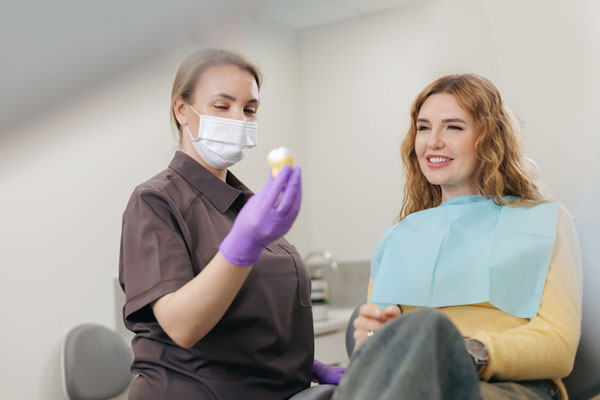 Every patient's Invisalign® treatment regimen is unique. However, the way a treatment plan is developed is comparable. This article describes the process of developing a treatment plan for Invisalign. Your dentist will design a personalized Invisalign treatment plan tailored to your situation.
Every patient's Invisalign® treatment regimen is unique. However, the way a treatment plan is developed is comparable. This article describes the process of developing a treatment plan for Invisalign. Your dentist will design a personalized Invisalign treatment plan tailored to your situation.
How is an Invisalign treatment plan created?
Ahead of any Invisalign treatment, the dentist must do an exam and x-rays to establish whether the patient is eligible for Invisalign aligners. The dental professional will also use a digital scan of the teeth to create 3D models or utilize the traditional impression-taking method. This information will help the dentist determine whether the patient's teeth can be straightened with this orthodontic treatment.
Once it has been decided that Invisalign is a good fit, the dentist will create a comprehensive treatment plan for dental alignment, including the movements the teeth should make throughout treatment. These instructions will be detailed, including the time and sequence of the motions the teeth will make.
Making the Invisalign trays
The dentist then sends the customized Invisalign plan and instructions to the lab that will fabricate the Invisalign aligners. The dentist will get a functioning model that will show how the teeth will line up, and the bite will come together depending on the treatment plan. If the dentist believes that modifications are necessary, the model may be updated and adjusted as many times as needed to get the best possible outcome.
This thorough preparation and planning show how the teeth will look when the orthodontic treatment ends, typically in about 12 months. Thanks to the digital component and design approach, this is achievable, even before patients get the first Invisalign aligner over their teeth.
The treatment process begins
Treatment starts once the dentist has approved the Invisalign treatment plan, the aligners have been manufactured, and materials sent back to the dentist. At each dentist visit, patients will be given multiple sets of aligners. Check-ups for Invisalign users are less frequent than for conventional metal brace users.
Patients are primarily responsible for the progress of the Invisalign treatment. It is crucial to stay committed to the orthodontic treatment, keeping the aligners on the teeth for 20 to 22 hours each day and carefully cleaning them.
After treatment
It becomes necessary to keep the teeth in their new locations after wearing the final set of Invisalign aligners. Retainers are an important last step in the Invisalign treatment. The retainers may be worn only at night or worn a couple of days per week. Failure to wear the retainers as directed may cause the teeth to shift back to their previous positions.
In conclusion
It is important to see a certified Invisalign provider since the treatment's success depends on the dentist's expertise and experience. Invisalign treatment is a complex and comprehensive procedure that requires careful work from your dentist. To begin your journey towards a new smile, schedule an appointment with our dental office today.
Request an appointment or call Chesterfield Dentist at 804-412-0867 for an appointment in our Chester office.
Recent Posts
Invisalign® clear aligner trays are not just for adults; teenagers and some children can also benefit from this treatment system. Many teens prefer Invisalign® over traditional braces because of the numerous advantages it offers, including:Discreet treatment appliancesMore comfort throughout the entire processRemovable trays for improved oral hygieneWhile wearing these trays is easy and relatively effortless,…
The teenage years can be awkward, especially for those who have to deal with crooked teeth. Invisalign® presents an alternative to traditional braces, and these clear aligners can have the same corrective impact with less discomfort both physically and socially for a self-conscious teen. The benefits of clear aligners and the ability to correct an…
If you and your child are interested in an alternative to traditional braces, Invisalign® may be just what you are looking for. It is just as effective at straightening teeth as traditional braces but has certain qualities that make it more tolerable for teenagers.It is usually preferable to wait to delay teeth straightening treatment until…


